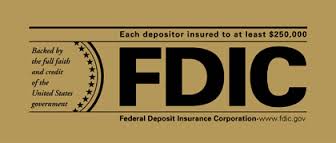
Update Guaranteed Investment Options Aug 26 2025

Is an FDIC investment a viable alternative to stocks?
With the ups and downs of the markets, some investors prefer to be in risk free investments to avoid the stress of losing money.
That said, with interest rates off the zero percent floor we had seen since 2008 or so, there are options for risk free investing in both annuities and government guaranteed debt instruments.
We have covered annuities many times here on Money Matters but in a nutshell, you can purchase an annuity which gives you a portion of the stock market increase but have no downside at all. Think of it as gathering up vegetables in the garden and keeping them in the fridge. The vegetables represent profits. The next year you get no vegetables but the third year you get some more. The guaranteed annuities work kind of like that.
If the market goes up in year one, you get a portion of the increase. If the market goes down the next year, you keep what you made but don’t make any gains.
If the market goes up by the end of the third year, you get a portion of that and it is added to the first year’s profit.
Slowly your “profit” fridge can gather more and more vegetables but your “profits” can never be taken back.
Maybe some years you get vegetables and some years you don’t.
The point being, in up markets you make money. When the market drops, you make nothing but lose nothing. You get to keep your annual gains no matter what.
There are many varieties of annuities and they are all different but I hope you get the picture. Annuities are NOT government guaranteed however. They are guaranteed by the issuing insurance company.
On the government guaranteed side, savings accounts are obviously an option. Certain banks offer up to 5% APR with requirements. Major banks might tread down a little less.
Check out bankrate.com or nerdwallet.com to compare. Make sure whatever and whoever you use that they are FDIC insured.
The downside of a savings account is rates are not locked in and gains can be taxable.
CDs are also available as well as Treasury bills and Treasury notes. T bills are short term (up to one year) and the T notes are offered for longer terms.
Although both are backed by the government in one form or another, there are some differences between CDs and Treasuries.
CDs are issued by banks and credit unions while treasuries are issued directly by the U.S. government.
CDs usually pay a fixed interest while T bills don’t pay interest but are sold at a discount and redeemed at face value when mature. T notes can pay semi-annual interest.
CDs are insured up to $250,000 per depositor and per bank. T Bills and notes have no such limitations so might be preferred for larger amounts.
CDs and T bills/ notes if not kept to maturity may expose the buyer to a loss or gain of principal depending on what day to day interest rates do.
If kept to maturity however, the gains are fixed at time of purchase.
As for tax implications, this is the biggee.
CD interest can be taxable at federal, state and local levels while T Bills and T Notes are taxed at the federal level but may be exempt at the state/local level.
CDs might be the choice for safe, predictable returns and fit the short to medium term investor while T bills and T notes might yield a slightly higher return due to the tax implications.
T bills are sometimes used to park money short term while T notes might be better suited for the medium to longer term investor.
T bills and notes and even CDs are easily purchased through most financial institutions. You can start by asking your bank or stock brokerage firm.
Both CDs, T bills and T notes should carry no fees to purchase them.
In conclusion, you can also by T bill funds like a stock through your broker, but because of the mechanics of how they work, prices can vary day to day and you can lose money.
(end)
(As mentioned please use the below disclaimer exactly) THANKS (Regulations)
This article expresses the opinion of Marc Cuniberti and is not meant as investment advice, or a recommendation to buy or sell any securities, nor represents the opinion of any bank, investment firm or RIA, nor this media outlet, its staff, members or underwriters. Mr. Cuniberti holds a B.A. in Economics with honors, 1979, and California Insurance License #0L34249 His insurance agency is BAP INC. insurance services. Email: news@moneymanagementradio.com.







